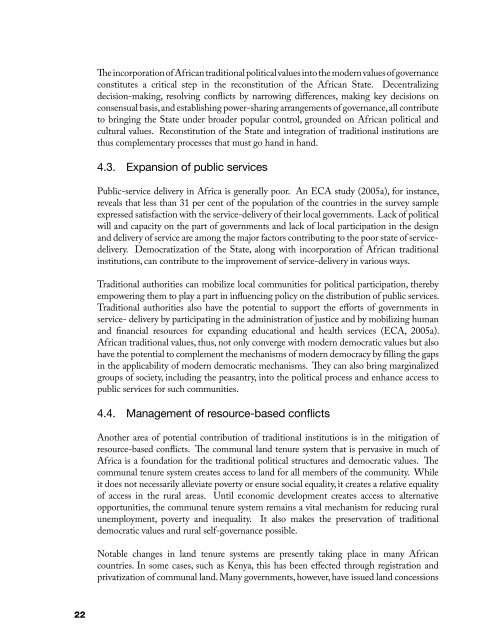Relevance of - United Nations Economic Commission for Africa
Relevance of - United Nations Economic Commission for Africa
Relevance of - United Nations Economic Commission for Africa
You also want an ePaper? Increase the reach of your titles
YUMPU automatically turns print PDFs into web optimized ePapers that Google loves.
The incorporation <strong>of</strong> <strong>Africa</strong>n traditional political values into the modern values <strong>of</strong> governance<br />
constitutes a critical step in the reconstitution <strong>of</strong> the <strong>Africa</strong>n State. Decentralizing<br />
decision-making, resolving conflicts by narrowing differences, making key decisions on<br />
consensual basis, and establishing power-sharing arrangements <strong>of</strong> governance, all contribute<br />
to bringing the State under broader popular control, grounded on <strong>Africa</strong>n political and<br />
cultural values. Reconstitution <strong>of</strong> the State and integration <strong>of</strong> traditional institutions are<br />
thus complementary processes that must go hand in hand.<br />
4.3. Expansion <strong>of</strong> public services<br />
Public-service delivery in <strong>Africa</strong> is generally poor. An ECA study (2005a), <strong>for</strong> instance,<br />
reveals that less than 31 per cent <strong>of</strong> the population <strong>of</strong> the countries in the survey sample<br />
expressed satisfaction with the service-delivery <strong>of</strong> their local governments. Lack <strong>of</strong> political<br />
will and capacity on the part <strong>of</strong> governments and lack <strong>of</strong> local participation in the design<br />
and delivery <strong>of</strong> service are among the major factors contributing to the poor state <strong>of</strong> servicedelivery.<br />
Democratization <strong>of</strong> the State, along with incorporation <strong>of</strong> <strong>Africa</strong>n traditional<br />
institutions, can contribute to the improvement <strong>of</strong> service-delivery in various ways.<br />
Traditional authorities can mobilize local communities <strong>for</strong> political participation, thereby<br />
empowering them to play a part in influencing policy on the distribution <strong>of</strong> public services.<br />
Traditional authorities also have the potential to support the ef<strong>for</strong>ts <strong>of</strong> governments in<br />
service- delivery by participating in the administration <strong>of</strong> justice and by mobilizing human<br />
and financial resources <strong>for</strong> expanding educational and health services (ECA, 2005a).<br />
<strong>Africa</strong>n traditional values, thus, not only converge with modern democratic values but also<br />
have the potential to complement the mechanisms <strong>of</strong> modern democracy by filling the gaps<br />
in the applicability <strong>of</strong> modern democratic mechanisms. They can also bring marginalized<br />
groups <strong>of</strong> society, including the peasantry, into the political process and enhance access to<br />
public services <strong>for</strong> such communities.<br />
4.4. Management <strong>of</strong> resource-based conflicts<br />
Another area <strong>of</strong> potential contribution <strong>of</strong> traditional institutions is in the mitigation <strong>of</strong><br />
resource-based conflicts. The communal land tenure system that is pervasive in much <strong>of</strong><br />
<strong>Africa</strong> is a foundation <strong>for</strong> the traditional political structures and democratic values. The<br />
communal tenure system creates access to land <strong>for</strong> all members <strong>of</strong> the community. While<br />
it does not necessarily alleviate poverty or ensure social equality, it creates a relative equality<br />
<strong>of</strong> access in the rural areas. Until economic development creates access to alternative<br />
opportunities, the communal tenure system remains a vital mechanism <strong>for</strong> reducing rural<br />
unemployment, poverty and inequality. It also makes the preservation <strong>of</strong> traditional<br />
democratic values and rural self-governance possible.<br />
Notable changes in land tenure systems are presently taking place in many <strong>Africa</strong>n<br />
countries. In some cases, such as Kenya, this has been effected through registration and<br />
privatization <strong>of</strong> communal land. Many governments, however, have issued land concessions<br />
22
















